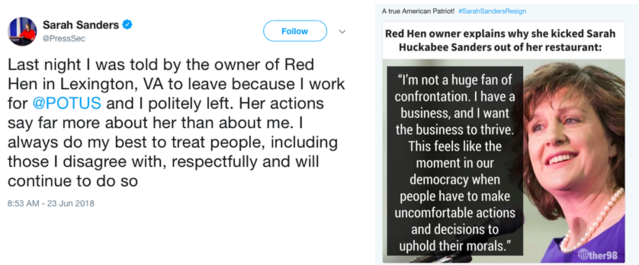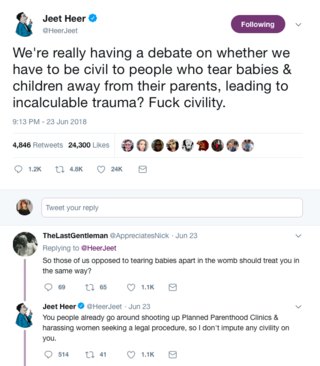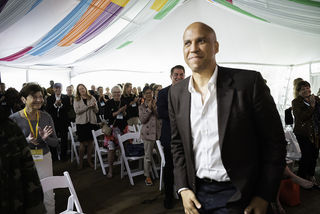President Donald Trump
'Radical love' is one of Aspen's 'Big Ideas.'
Cory Booker says he loves Donald Trump. And you can too.
Posted June 25, 2018

In the opening session of the 2018 Aspen Ideas Festival, Jeffrey Goldberg of The Atlantic wondered aloud how to reach Americans who don’t trust the “mainstream media.” Goldberg paraphrased a statement made last year by Secretary of Defense James Mattis: “The problem in America is that we’ve stopped liking each other.” As Amy Walter, national editor of the Cook Political Report, noted in another Festival session, it has become widely accepted that in order to get people to vote, we have to get them to be angry. The problem, she laments, is that angry people vote for angry politicians who engage in angry politics, and the cycle continues.

The latest scorched earth campaign began on June 22 when Sarah Huckabee Sanders was asked to leave a restaurant. The restaurant owner framed it as "upholding her morals." On social media, some Republican partisans responded with calls to boycott the restaurant. (A restaurant with a similar name in another town, mistaken for the restaurant in question, even received a barrage of hateful messages.) California Congresswoman Maxine Waters escalated by exhorting Democrats, "If you see anybody from that Cabinet in a restaurant, in a department store, at a gasoline station, you get out and you create a crowd. And you push back on them. And you tell them they're not welcome anymore, anywhere." Meanwhile, cooler heads called for a return to civility. In response, Twitter exploded with "Fuck civility."

Now a national debate is underway: Should we restore our civic norms of mutual toleration, civility, and forbearance, or engage in a war of exclusion, derision, and dehumanization? When roughly half of the country is viewed by mainstream journalists as morally polluted, it's hardly surprising that many come to view certain media outlets with a healthy dose of mistrust.
For inspiration in his quest to reach those who don't trust The Atlantic, Goldberg could listen to his own brilliant interview of New Jersey Senator Cory Booker in which Goldberg asked whether the Senator agreed with the restaurant owner who refused to serve Sanders.
The following is their (edited) conversation:
CB: I believe in a radical love. I believe that we should love those who hate us. I believe we should love those who scorn us. Our nation right now is settling for this ideal of “tolerance” when we should be reaching for the ideal of love. Tolerance is “I’m stomaching your right to be different, but if you disappear off the face of the earth, I don’t care—I’m no worse, I’m no better off.” Love says “I see you.”
JG: But what if that person doesn’t love you?
CB: When Chris Christie was my governor, I was the mayor of the largest city… I could write a dissertation on my disagreements with him, but we are friends and I love him. And I’m angry at him for cutting Planned Parenthood funding, for eroding the earned income tax credit… I could go on with that. But the point I’m making is he was on the presidential primary stage getting pilloried more than once by his colleagues for the sin of hugging Barack Obama. And that hug was after Hurricane Sandy.
Fast forward to just a few months ago: John McCain during the health care debate gets what could be a terminal cancer diagnosis, comes to the Senate floor, he gives a profound speech, I cross the Senate floor in front of the CSPAN cameras ... and I hug John McCain… and I go home and I’m getting pilloried on the internet, on Twitter, by people in my own party saying, “How could you hug him?”
Have we gotten to the point in America where we hate each other so much that it’s a betrayal of your tribe to serve a person a meal? It’s a betrayal of your tribe to have a conversation with somebody? We as a country right now… have this poverty of empathy where we can’t see the suffering of folk that are in a factory town. We can’t see the suffering of folk that live in the central ward of Newark New Jersey. To love, you have to know someone, you have to pay attention, you have to see them. [That lack of connection is] really eroding our democracy.
Source: Aspen Ideas Festival/Photographer Dan BayerJG: The majority of white people voted for Donald Trump… do you try to go through that exercise of what white voters—who might hate you—who voted for Donald Trump are going through?

CB: I’m listening to this great book on Audible: The Radical King. [Reverend Martin Luther King] literally goes through this incredible intellectual exercise of empathy and love: saying that [the] white man who hates me, who beats me … he must have grown up in a family where all he got for breakfast, lunch, and dinner was that kind of hatred. He literally goes through this powerful period of empathy and comes to the conclusion that I love that person. That’s a radical love. So I take time to sit and listen—from airports to my friends in the Senate across the aisle—to understand the anger.
Ninety percent of baby boomers did better than their parents. We’re now at a time when it’s a toss-up. Just fifty percent will do better. There are communities here who see themselves working harder than their parents. Everything is going up: the cost of childcare the cost of college… they don’t believe anymore that they live in a country where their children are going to do better than them. And they’re angry. And they’re right to be angry. Because there’s so much of a betrayal … and I’m not just pointing to elected leaders—all of us have allowed our country to drift away from those core ideals.
So yeah, they look at a guy like Donald Trump. I may see him as one of the most sophisticated carnival barkers there ever is, but they say, “This is a guy who would take a punch for me and my family. This is a guy who will throw a punch. Because I feel him in my gut. Because nobody is listening to me.” And—Baldwin said this—there is nothing more dangerous than a person who has nothing to lose. So right now we live in a country where Donald Trump wants to play the race card right away: blame Muslims, Mexicans, you name it. You have people that are trying to exploit anger and trying to call to our lesser angels. But let’s understand that these are my fellow Americans who support Donald Trump, and if we demean them and degrade them; if we meet hate with hate as opposed to love, then we are contributing to the very things that we’re decrying.
JG: So how do Democratic leaders confront Trumpism without using the tactics that many of Donald Trump’s supporters use.
CB: I don’t want to confront Trumpism, I don’t want to confront Chuck Schumerism… I want us to be leaders in America – I really want all of us to be leaders in America. And everybody here is culpable for the current state. You have no right to believe you’re not – you know, it’s not about “blame” it’s about responsibility. Those ten two-letter words are so important: “If it is to be it is up to me.”
We were joking earlier about me being a vegan. I was at a humane society event… I was just in my element here. All the hors d’oeuvres are vegan and I don’t even have to ask! (And I don’t have anybody coming up to me asking me where I get my protein from.) It was an exciting environment; I’m just so thrilled. And then this woman comes up to me and we hug (there’s a lot of hugging going on), and then she pulls out her cell phone, “Look what I tweeted at Paul Ryan!” … And I read just this vicious, vile, meanness, and it was so incongruent. We add to this environment in what we do and what we say every day. And we have to say, “are we adding light or are we adding darkness?” And what we say about Donald Trump is more of a reflection of who we are than who he is. And we’ve got to watch what we say.

[During the convention], Donald Trump finally tweets about me. Chris Cuomo builds this up, trying to get me. He says “This is what Donald Trump said about you. What do you have to say to Donald Trump?” And I just took a deep breath and I said, “Look… I love Donald Trump. I was taught by my parents growing up in a small, black church in Closter New Jersey—things I’ve said before about loving your enemy, loving your neighbor… Love thy neighbor, no exceptions.” And I said, “I don’t want Donald Trump to be my President. I’m going to do everything I can to stop him. But I’m never going to let him drag me so low as to hate him.”
I really believe that we are at a moral moment—we’re at a deeply moral moment. And we can descend. People don’t think this can get worse; it can get a lot worse. And we have a choice of how we’re going to react. Because you’re not defined in life by what happens to you; you’re defined by how you react. My father told me over and over when I was a kid you can go through live in two ways: A thermometer or a thermostat. A thermometer, you just reflect the world around you. “Be a thermostat, son, be a thermostat. Set the temperature. Change the energy around you.”
[We have to be] not just agents of love, but we have to be like the alchemists of old—not changing coal into gold, but turning hate into love. ♦

Note: The author's views are her own and should not be considered the official positions of FIRE or any other organization with which the author is associated.




